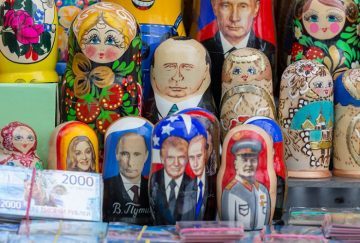Samuel Clowes Huneke in the Boston Review:
 Last Thursday, Nobel-winning economist Paul Krugman issued a warning in the New York Times. “The pandemic will eventually end,” he wrote, “but democracy, once lost, may never come back. And we’re much closer to losing our democracy than many people realize.” Citing the Wisconsin election debacle—the Supreme Court ruled that voters would have to vote in person, risking their health—Krugman argued that Donald Trump and the Republican Party are using the crisis for their own, authoritarian ends.
Last Thursday, Nobel-winning economist Paul Krugman issued a warning in the New York Times. “The pandemic will eventually end,” he wrote, “but democracy, once lost, may never come back. And we’re much closer to losing our democracy than many people realize.” Citing the Wisconsin election debacle—the Supreme Court ruled that voters would have to vote in person, risking their health—Krugman argued that Donald Trump and the Republican Party are using the crisis for their own, authoritarian ends.
Krugman is not alone. As early as last month, when cases of COVID-19 first began to surge in the United States, Masha Gessen wrote in the New Yorker that the virus was fueling “Trump’s autocratic instincts.” They argued, “We have long known that Trump has totalitarian instincts . . . the coronavirus has brought us a step closer.” This is indeed the once and future critique of the Trump presidency: that Trump is a totalitarian at heart and, if given the chance, “would want to establish total control over a mobilized society.” A few days ago, Salon published an article arguing that the president is using the virus to prepare “the ground for a totalitarian dictatorship.” Even Meghan McCain, as unlikely a person as any to agree with Gessen, indicated recently that Trump has “always been a sort of totalitarian president” and that he might use the virus to “play on the American public’s fears in a draconian way and possibly do something akin to the Patriot Act.”
These critiques make ample use of the term totalitarianism—“that most horrible of inventions of the twentieth century,” in Gessen’s summation. They and other commentators also use it to describe Fidel Castro’s Cuba to Vladimir Putin’s Russia, which Gessen left in 2013. As right-wing populism has surged around the world in recent years, the term has had something of a renaissance. Hannah Arendt’s 1951 classic The Origins of Totalitarianism became a best seller again after Donald Trump’s election in November 2016.
This uptick in the term’s use runs counter to the trend among historians, for whom the idea of totalitarianism carries increasingly little weight.
More here.
